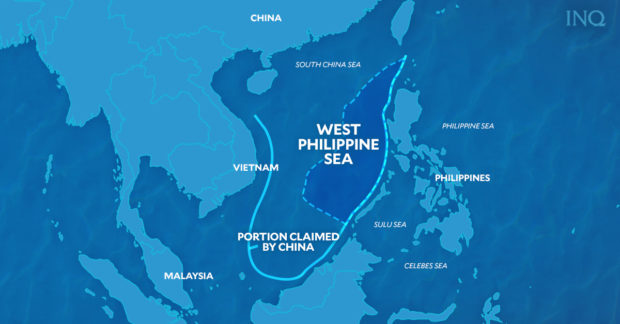House passes on 2nd reading bill establishing archipelagic sea lanes

The West Philippine Sea is part of the archipelagic sea lanes that the bill proposes to establish.
MANILA, Philippines — The House of Representatives passed on its second reading on Wednesday House Bill No. 9034 — or the proposed Philippine Archipelagic Sea Lanes Act, which consolidated four bills.
Under the bill, foreign ships and aircraft will be allowed to pass through the designated sea lanes as quickly as possible for the sole purpose of “continuous, expeditious and unobstructed transit.”
They would also be directed to refrain from using any threat or force that would go against the “sovereignty, territorial integrity or political independence of the Republic of the Philippines.”
The bill establish the following axis lines:
- Sea Lane I: Philippine Sea – Balintang Channel – West Philippine Sea
- Sea Lane II: Celebes Sea – Sibutu Passage – Sulu Sea – Cuyo East Pass – Mindoro Strait – West Philippine Sea
- Sea Lane III: Celebes Sea – Basilan Strait – Sulu Sea – Nasubata Channel – Balabac Strait – West Philippine Sea
Pangasinan 3rd District Rep. Maria Rachel Arenas, who chairs the House Committee on Foreign Affairs, sponsored the bill.
In her sponsorship speech, Arenas said the bill — like the baselines law that aligns the Philippines with the United Nations Convention on the Law of the Sea (Unclos) — was just a step towards fully recognizing the Philippines as an archipelagic state.
“Still to be done, however, are the legislations on the following: one, to define the maritime jurisdictions of the Philippines under Unclos; and two, to designate the [ASLs] in Philippine archipelagic waters to rationalize and prevent arbitrary international passage in our archipelago,” Arenas said.
“Our strategic position in the Indo-Pacific region underscores the sacred duty bestowed upon us — the duty to safeguard our territorial integrity and national security. With Unclos balancing the interests of archipelagic states and maritime powers, two options are before us: to proactively designate ASLs or to perilously waive this right in favor of foreign vessels,” she added.
Last Oct. 26, Bicol Saro party-list Rep. Brian Raymund Yamsuan — one of the bill’s principal authors — urged his colleagues to pass the proposal on the resumption of the House session.
Yamsuan explained that while the House had already passed the proposed Philippine Maritime Zones Act on its third and final reading, there would still be a need to set sea lanes and air routes to solidify the country’s sovereignty over disputed areas.
According to Yamusan, it is important to set these lanes at a time when China’s incursions in the West Philippine Sea are becoming more frequent.
“China is becoming too daring in its actions. Now that they are inside our EEZ [exclusive economic zone], we don’t know if tomorrow they will be inside our territory. Let us not wait for them to enter again while all we can do just protest,” Yamsuan said in Filipino.